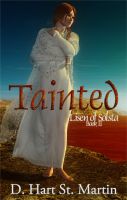 What is the name of the book and when was it published?
What is the name of the book and when was it published?
Tainted (Lisen of Solsta, Book II), published 10/31/2013.
What’s the book’s first line?
“Three days. Three freakin’ days of waiting, mostly alone, in this little stone room with no windows, not even a television. At least a TV would have given her something to do.”
What’s the book about? Give us the “pitch”.
In Fractured, Lisen Holt discovered she didn’t belong on Earth, and re-adapting to Garla, the place of her birth, was difficult. The greater challenge, however, came when she learned that she was Garla’s Heir-Empir and must confront her twin brother for the throne. Witnessing a friend’s murder and surviving the events surrounding that tragedy left Lisen fractured, with little hope she’d recover. Her story continues in Tainted as she and her guardian companion, Korin, travel to the great desert of Thristas. They hope to find safety in the anonymity of the barren wilderness, out of the range of Garlan spies. There, Lisen learns the ways of Thristas and its fierce people who view Garla’s Empir as a tyrant. In an effort to secure their safety, Lisen and Korin participate in a spring fertility ritual which changes everything, and Lisen returns to Garla with a brilliant but damning plan that she believes will ensure her victory against her brother.
What inspired you to write the book? A particular person? An event?
I began writing this story in 1977. Much has changed since then, but one thing hasn’t. Sexism and the subjugation of women remains rampant in our world. I wrote (and continue to write) this series to answer the accusations of anti-feminists that equal pay and equal opportunities for women will destroy the sanctity of the family, not to mention the “world as we know it.” I say, “Not so,” and Lisen-as-archetypal-hero and the androgynous society of Garla are the proof of that.
What’s the most distinctive thing about the main character? Who-real or fictional-would you say the character reminds you of?
From the beginning, Lisen must confront the duality of the two worlds she has inhabited and how their sometimes very different realities have affected her. It’s a difficult balance, one she manages to maintain, but only after a great deal of practice. In addition, she is a female hero without the typical female baggage with which far too many female fantasy heroes are encumbered. (Too many times I’ve read the beginning of a book where the female protagonist comes tearing down a flight of stairs, and an old wise person—usually male—wonders aloud why she can’t act more like a girl.) Lisen reminds me of a feistier Katniss Everdeen of Hunger Games fame with some of the calm courage of Malala Yousafzai.
What’s the main reason someone should really read this book?
I believe everyone, including young women, want to identify with a hero, a hero they can count on to make mistakes and move beyond them, to make decisions she may or may not regret, to fight for what she believes is right without worrying about the consequences for herself. They want to look up to someone who’s not so different from them.
Lisen of Solsta is an Earth brat who, like her contemporaries here, loves music and social media and the convenience of cell phones and automobiles, but when tested, Lisen steps up and accepts the challenge of her new life and its responsibilities. Her story provides a model for moving beyond the all-play, no-work life of a child into the equally stimulating, perhaps more satisfying role of an adult.
